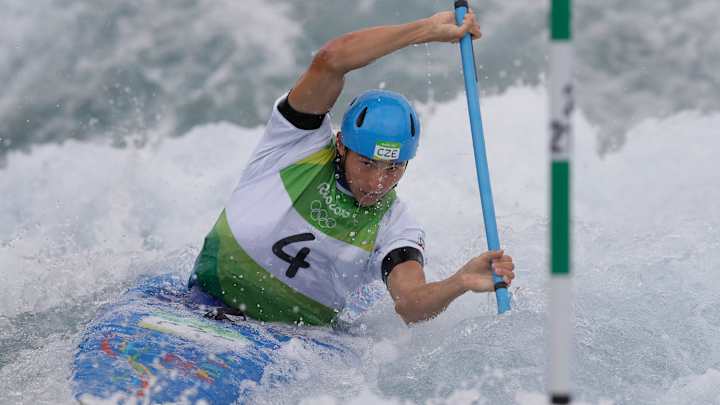Inspired by Redgrave note, British kayaker wins slalom gold

RIO DE JANEIRO (AP) At the request of a kid from a town named Stone, five-time Olympic rowing champion Steve Redgrave sent a signed picture with the words, ''No Stone Unturned.''
That kid, Joe Clarke, stuck the picture on his bedroom wall and used it for inspiration as he got better at canoe slalom.
On Wednesday, Clarke was still pinching himself on the podium at Whitewater Stadium as the Union Jack flew highest in honor of his Olympic gold-medal triumph in kayak.
In windy, rainy, gloomy conditions - ''I'm glad the British weather came,'' he said - Clarke came down the course eighth in the 10-man final, and enjoyed a clean run, taking over first place 0.17 seconds faster than the previous paddler, two-time world champion Peter Kauzer of Slovenia.
Knowing there were only two paddlers left, Clarke was assured of at least a bronze medal.
''I was absolutely ecstatic,'' he said. ''To then upgrade it to the silver, and upgrade it again to the gold ... is like, Olympic champion Joe Clarke, Olympic champion, like, what?''
Right after Clarke, Jiri Prskavec of the Czech Republic, the current world champion, was fastest through the first quarter and then penalized for touching a gate with his head. Last man, Jakub Grigar of Slovakia, the world junior champion, could place only fifth.
Typically in the tight canoe community, they were his friends, so he wasn't wishing them ill luck, but he admitted to being nervous while waiting in his kayak the finish area.
''For sure, I've had some luck, and you need a bit of luck in this sport to excel. That's come today,'' Clarke said. ''I don't know what I did to deserve that but I did something right along the way.''
Kauzer finished with the silver medal, and Prskavec got the bronze. It was the first Olympic medals for all three, and only the second gold in canoe slalom for Britain.
Thanks to government funding, Clarke and the British team came to Rio de Janeiro often enough for training camps to consider Whitewater Stadium a second home. His family believed in him enough that 20 relatives and friends were in the stands to watch, including his parents and brother.
''I've certainly made it worthwhile them coming here,'' he said. ''My parents sacrificed so much for me.''
Clarke was initially turned away by his local Stafford and Stone Canoe Club because he was too young to join, but when some places became open for young paddlers, he was invited to write a letter to explain why he should be given a chance. He was one of eight applicants from 60 to be accepted, and joined the club when he was 11.
Despite having never previously won a major race, the 23-year-old Clarke found a groove in the roaring waters of his ''second home'' to be a medal contender through the heats, where he placed second overall, and the semifinals, where he placed third. Making the final was his main goal, and a medal a bonus.
As for Redgrave, he'd seen him in person across a room once at Britain's Rio base before the Olympics, and they finally spoke for the first time in a congratulatory radio call after the win.
''That was amazing to hear from him,'' Clarke said. ''I left no stone unturned out there today.''
